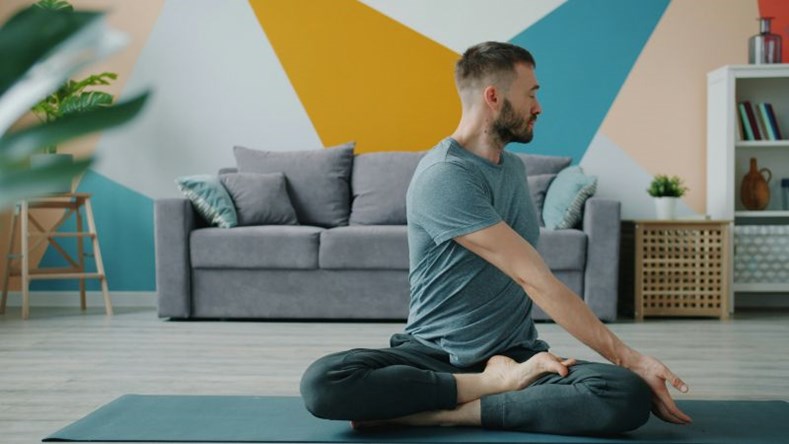Our mental health, like our physical health, varies all the time. Looking after our mental health is not only good for us now, it can also help us deal with and manage difficult times in the future. Over time, it may also reduce our risk of physical health problems.
Here’s some ways for you to look after your mental health:
1. Stay physically active
Regular exercise is one of the most effective ways to boost your mood, reduce stress, and improve overall wellbeing.
You don’t need to run marathons or spend hours in the gym - walking, dancing, yoga, or even cleaning can all make a real difference. The key is consistency. Aim for around 30 minutes of movement most days, in whatever form feels enjoyable and sustainable.
When you move, your body releases endorphins – natural “feel-good” chemicals that lift your mood and help you feel more positive. Over time, regular activity can also reduce anxiety and depression, while supporting better sleep and protecting your physical health.
Read our top tips on how to increase your physical activity.
|
Everyday movement idea |
Description |
|
Walking or cycling |
Choose active transport instead of driving to support fitness and reduce stress. |
|
Morning stretching |
Stretch while making breakfast to boost flexibility and start the day energised. |
|
Dancing or social classes |
Join dance classes or activity groups to stay active and socially connected. |
|
Gardening & nature |
Connect with nature through gardening for physical movement and mental calm. |
|
New hobbies & sports |
Try rollerblading, skateboarding, martial arts, or tennis for fun and fitness. |
|
Small daily changes |
Take the stairs instead of the elevator to build more movement into your day. |
|
Mindful movement |
Practice yoga, Pilates, or tai chi for meditative exercise and mindfulness. |
No matter how you move, every bit counts.
You don’t need to start big - even small steps can make a real difference to your mental and physical health. Reframe movement as something simple and doable, not something to fear or perfect.

2. Yoga or stretching at home
Yoga and gentle stretching are simple ways to calm the mind and ease tension in the body. Even a few minutes a day can help improve flexibility, reduce stress, and support better sleep. You don’t need any special equipment - just a quiet space and a willingness to slow down, breathe deeply, and reconnect with yourself.

3. Eat for brain health: key nutrition tips
A brain-healthy diet supports focus, memory, and mood. Staying hydrated, eating plenty of fruits and vegetables, adding protein, and including healthy fats like omega-3s all play a vital role in mental wellbeing. Limiting caffeine, supporting gut health with probiotics and wholegrains, and reducing alcohol intake can further improve concentration, energy, and emotional balance.
|
Category |
Description |
|
|
Hydration |
Drink water, tea, juice, smoothies. Avoid dehydration, track intake, limit caffeine & sugar. |
|
|
Fruits & vegetables |
Eat a variety daily. Fresh, frozen, tinned, dried, or juiced all count. Affordable & easy options. |
|
|
Protein |
Boost brain function & mood. Sources: beans, lentils, nuts, seeds, dairy, eggs, fish, soy. |
|
|
Caffeine |
Energy boost but may cause anxiety, low mood, poor sleep. Reduce gradually, swap for decaf. |
|
|
Healthy fats |
Omega-3 & 6 support brain health. Eat nuts, seeds, avocados, oily fish (tinned = budget-friendly). |
|
|
Gut health |
Gut–mood connection. Eat wholegrains, fruit, veg, pulses, probiotics (yoghurt, kimchi). Manage stress. |
|
|
Alcohol |
Disrupts brain chemistry & mood. Can worsen mental health. Seek support if dependency issues. |
3. Sleep like it matters
- Quality sleep is foundational to emotional regulation and mental clarity.
- Maintain a consistent sleep schedule, create a bedtime routine, and avoid screens before bed.
If You Can’t Sleep, Try This:
|
Sleep Tip |
How to Do It |
|
Focus on your breathing |
Try the 4-7-8 technique – breathe in for 4 seconds, hold for 7, breathe out for 8. Repeat a few times. |
|
Progressive muscle relaxation |
Starting at your toes, gently tense and release each muscle group up to your head. |
|
Visualise a calm place |
Picture a peaceful scene in detail – a beach, forest, or somewhere you feel safe and relaxed. |
|
Get out of bed if you're restless |
If you’re tossing and turning, get up and do something calming (like reading or stretching) until you feel sleepy. |
|
Avoid screens |
Stay off phones or TVs – the light can trick your brain into staying awake. |
|
Try a calming sound |
Soft music, nature sounds, or a sleep meditation can help slow your thoughts. |
|
Stick to a wind-down routine |
A warm drink, dim lighting, and consistent bedtime habits signal your body it’s time to rest. |
Check out our 'Guide to improving your sleep' for top tips and common causes of poor sleep.
4. Connect with others
- Strong social ties help buffer against stress, anxiety, and depression.
- Reach out to talk, laugh, or simply be with someone who gets you - even a short call helps.

5. Practice mindfulness and presence
- Mindfulness helps reduce overthinking, anxiety, and reactivity.
- Try meditation, nature walks, slow breathing, or simply focusing on one task at a time.
Mindfulness is the practice of paying attention to the present moment with openness and without judgment. It involves being consciously aware of your thoughts, feelings, body, and surroundings as they are, rather than as you wish them to be.
The practice originates from Buddhist meditation traditions but is now widely used in secular settings to support mental wellbeing. No spiritual or religious beliefs are required to benefit from it.
6. Limit toxic inputs
- Cut down on doom-scrolling, negative news, or social media comparisons.
- Curate what you consume: uplifting, educational, or calming content is better for your mental space.
- Here are some tips to help:
Coping with Distressing News & Doom-Scrolling
Constant exposure to negative news can fuel stress, anxiety, and overwhelm. Setting healthy boundaries, curating trusted sources, and balancing news with uplifting content helps protect your mental health. Focus on what you can control, take breaks, and use calming activities to regain balance and perspective.
|
Category |
Description |
|
|
Time limits |
Check the news at set times only. Avoid constant updates. |
|
|
Mute alerts |
Turn off notifications to prevent constant distractions. |
|
|
Avoid scrolling |
Stop endless doom-scrolling. Follow trusted sources only. |
|
|
Facts vs opinions |
Focus on facts, avoid opinion overload to reduce stress. |
|
|
Balance content |
Add positive or uplifting media to balance negativity. |
|
|
Take breaks |
Step away from news regularly. You don’t need to stay updated 24/7. |
|
|
Focus on control |
List what you can change, let go of what you can’t. Notice stability in daily life. |
|
|
Shift attention |
Use calming or distracting activities to redirect focus. |
7. Express, don’t suppress
- Suppressed emotions can turn into stress, anxiety, or physical symptoms.
- Keep a Thoughts Diary, talk to someone you trust, or channel feelings into art, music, or movement.
8. Create a routine (with flexibility)
- Routines add structure and reduce decision fatigue.
- Even simple anchors like waking up, eating, or unwinding at consistent times can ground you.
9. Engage in meaningful activities
- Hobbies, volunteering, spiritual practice, or learning something new adds purpose and fulfillment.
- Doing something "just because it brings you joy" is never a waste of time.
10. Seek help when you need it
- Mental health is health, there’s no shame in needing support.
- Therapists, counselors, support groups, and hotlines exist to help you feel less alone.
11. Work life balance
Taking your lunch break matters, and it adds up. Over the course of a year, your lunch breaks can total nearly six extra weeks away from work. That’s time your mind and body need to rest, reset, and recharge.
Stepping away from your desk, even briefly, can boost focus, reduce stress, and improve overall wellbeing. It’s not just a break, it’s a vital part of your workday. Prioritise it. You’ve earned it.











